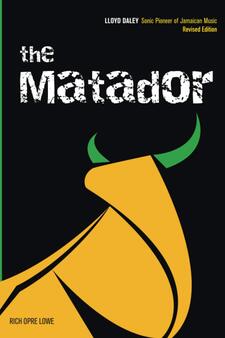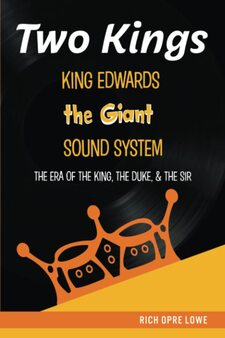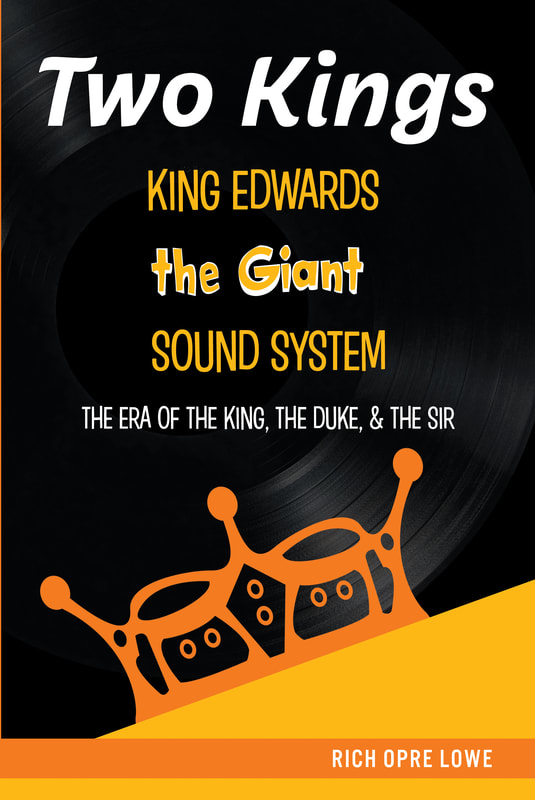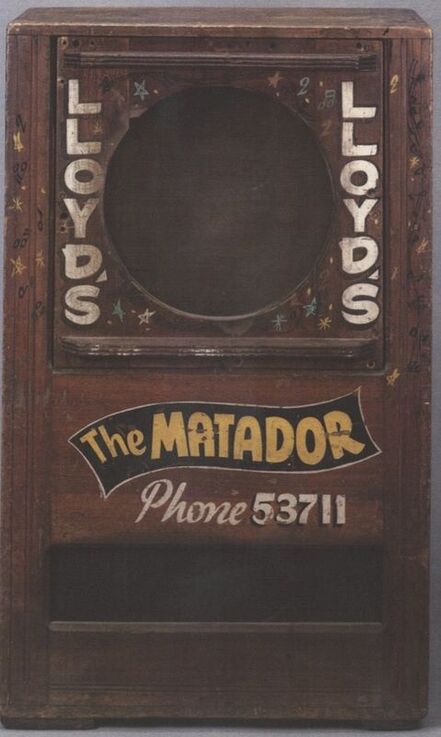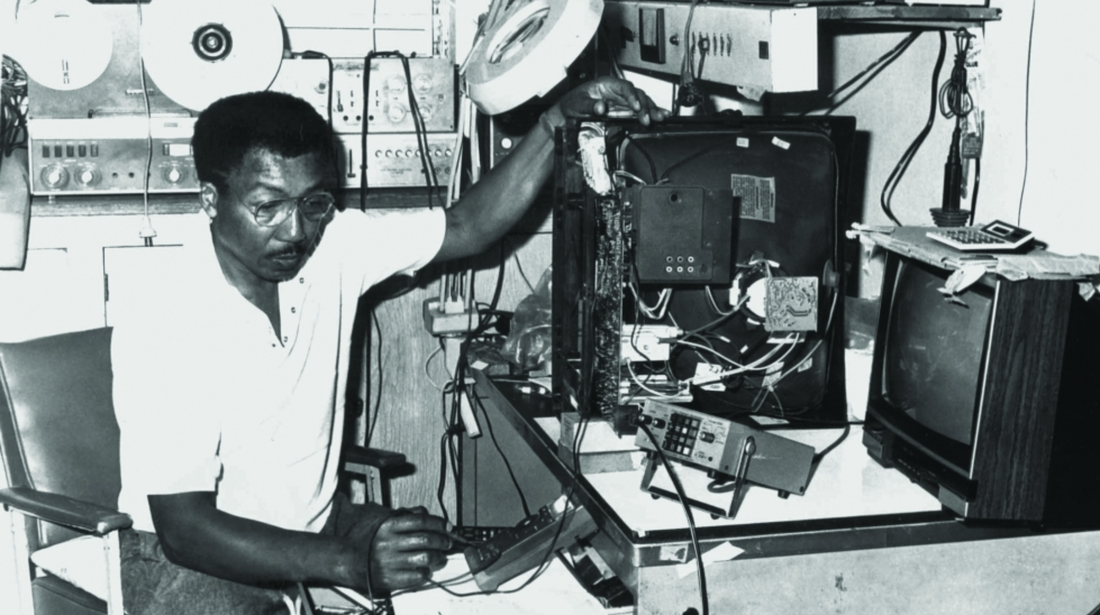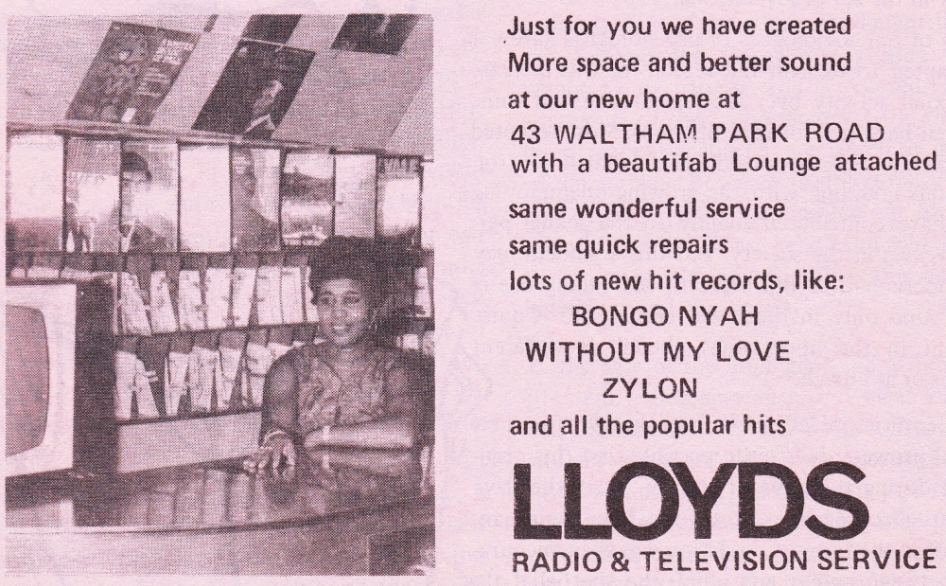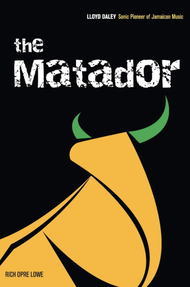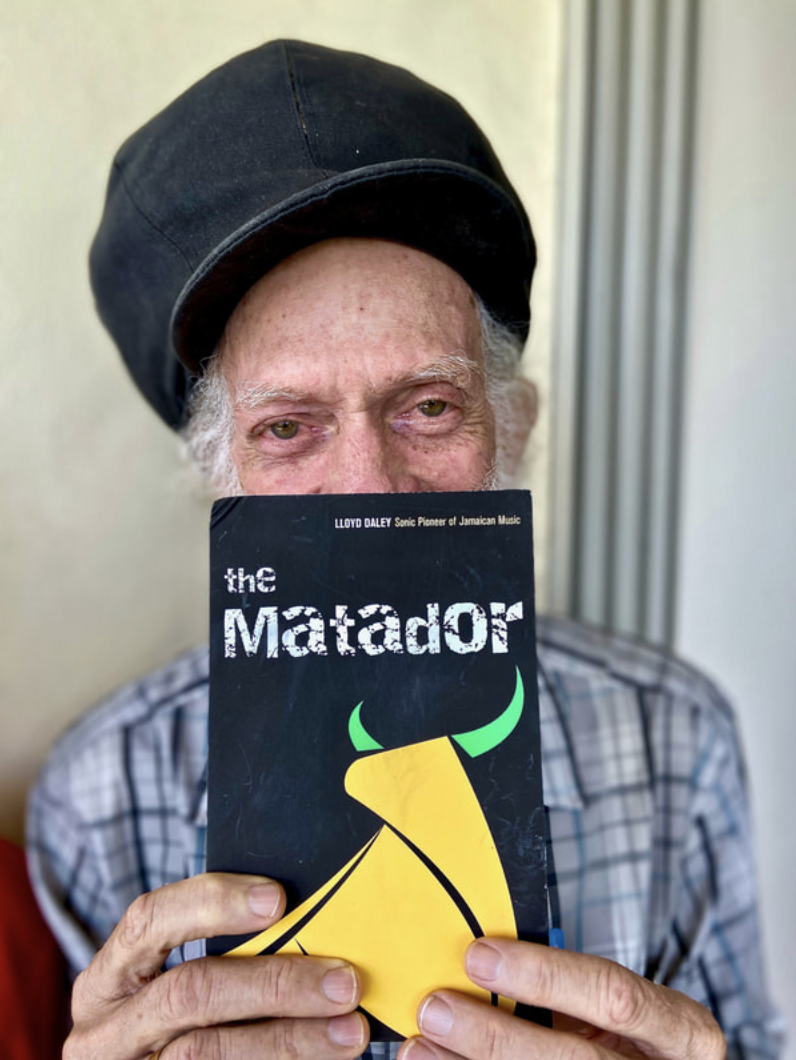"The Matador: Lloyd Daley - Sonic Pioneer of Jamaican Music"
|
"Two Kings Jamaica’s King Edwards 'The Giant' Sound System: The Era of The King, The Duke, & The Sir"
|
Below is a collection of information and interviews about Lloyd Daley "The Matador" and the release of "The Matador" book by me, Rich Lowe. For a more in depth interview with Daley, you can read our post by clicking here.
The Revised Edition of "Lloyd Daley, The Matador - Sonic Pioneer of Jamaican Music" can be purchased
in multiple formats on Amazon. The cost is super reasonable at (US) $15.25.
Be sure NOT to purchase any overpriced "used" versions that have been posted on Amazon.com.
Just click the button below to purchase!
in multiple formats on Amazon. The cost is super reasonable at (US) $15.25.
Be sure NOT to purchase any overpriced "used" versions that have been posted on Amazon.com.
Just click the button below to purchase!
"Lloyd Daley, The Matador – Sonic Pioneer of Jamaican Music"
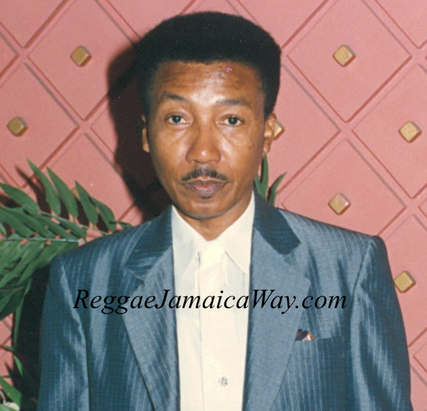
PRESS RELEASE
(January 14, 2020)
Lloyd Daley, reclusive and prolific Jamaican music producer, featured in revealing new biography The Matador by Rich Lowe
Lloyd “The Matador” Daley passed away on March 18, of 2018. Now - two years after his passing, a new book The Matador – Sonic Pioneer of Jamaican Music reveals the impact he made on Jamaican music that continues to this day. Author Rich Lowe revisits Daley’s memories of building some of the most powerful amplifiers on the island of Jamaica, forming the Matador Sound System, and becoming a top selling music producer in the golden eras of Jamaican Boogie-Shuffle, Ska, Rock Steady and Reggae music. Daley spent the last four years of his life working on this book project with Rich Lowe.
Lloyd Daley produced Jamaican music that was consistent and brimming with quality. He recorded artists of the era who have come to be recognized over time: Members of The Skatalites, Dennis Brown, The Gladiators, The Wailing Souls, The Heptones, Little Roy, Freddie McKay, Alton Ellis, The Ethiopians, The Hippy Boys, The Abyssinians, Count Ossie, The Viceroys, and many more. As a sound system owner, Daley battled with giants of the day like King Edwards, Coxson Dodd, Duke Reid, and Bells the President.
Unlike many other producers of the era, Daley was deeply involved in many of the technical aspects of Jamaican music production. He was reclusive, and in later years, reportedly angry over violations and piracy that he had experienced. Rich Lowe shares, “I was aware that even after sixty years since the start of his musical journey, that there was the possibility of speaking with Mr. Daley directly about his music. I decided to attempt contact. It was a long shot, and I don’t know what made him decide to engage in a dialogue. Much later, he would describe it as ‘vibes.’”
Mr. Daley put his trust in this book. Sound system owner Prince Jackie Robinson noted to the author, “You must be a special person for Mr. Daley to share this information with you. He never does that.” Robinson then laughed heartily and continued: “The Matador was The Matador. Is a man that never stand for no foolishness.”
The Matador – Sonic Pioneer of Jamaican Music is now available internationally via Amazon in paperback, Kindle and eBook formats.
(January 14, 2020)
Lloyd Daley, reclusive and prolific Jamaican music producer, featured in revealing new biography The Matador by Rich Lowe
Lloyd “The Matador” Daley passed away on March 18, of 2018. Now - two years after his passing, a new book The Matador – Sonic Pioneer of Jamaican Music reveals the impact he made on Jamaican music that continues to this day. Author Rich Lowe revisits Daley’s memories of building some of the most powerful amplifiers on the island of Jamaica, forming the Matador Sound System, and becoming a top selling music producer in the golden eras of Jamaican Boogie-Shuffle, Ska, Rock Steady and Reggae music. Daley spent the last four years of his life working on this book project with Rich Lowe.
Lloyd Daley produced Jamaican music that was consistent and brimming with quality. He recorded artists of the era who have come to be recognized over time: Members of The Skatalites, Dennis Brown, The Gladiators, The Wailing Souls, The Heptones, Little Roy, Freddie McKay, Alton Ellis, The Ethiopians, The Hippy Boys, The Abyssinians, Count Ossie, The Viceroys, and many more. As a sound system owner, Daley battled with giants of the day like King Edwards, Coxson Dodd, Duke Reid, and Bells the President.
Unlike many other producers of the era, Daley was deeply involved in many of the technical aspects of Jamaican music production. He was reclusive, and in later years, reportedly angry over violations and piracy that he had experienced. Rich Lowe shares, “I was aware that even after sixty years since the start of his musical journey, that there was the possibility of speaking with Mr. Daley directly about his music. I decided to attempt contact. It was a long shot, and I don’t know what made him decide to engage in a dialogue. Much later, he would describe it as ‘vibes.’”
Mr. Daley put his trust in this book. Sound system owner Prince Jackie Robinson noted to the author, “You must be a special person for Mr. Daley to share this information with you. He never does that.” Robinson then laughed heartily and continued: “The Matador was The Matador. Is a man that never stand for no foolishness.”
The Matador – Sonic Pioneer of Jamaican Music is now available internationally via Amazon in paperback, Kindle and eBook formats.
“One of the unsung heroes at the time of course was Lloyd ‘The Matador.’ He was very, very good because Lloyd used to build all these sound system amplifiers.”
- Graeme Goodall, Federal Recording Studio Engineer
“Big sounds were never, ever friendly with each other. They only pretended until they meet in the same dance hall and then it is a different thing.”
- Lloyd “The Matador” Daley
- Graeme Goodall, Federal Recording Studio Engineer
“Big sounds were never, ever friendly with each other. They only pretended until they meet in the same dance hall and then it is a different thing.”
- Lloyd “The Matador” Daley
Two Kings Feedback...
Dries Talloen - Writer at REGGAE.BE Website: http://www.reggae.be/en/index Selector at Roots Explosion Sound System
If time travel were possible, some of us would probably travel to Kingston, Jamaica in the 1950s to experience the early days of the sound system business. Rich Opre Lowe's new book comes closest to this. With numerous interviews and detailed information on every aspect the reader could possibly think of, Lowe traces the life story and musical careers of two brothers, George and Vin Edwards, together King Edwards the Giant Sound System.
After his previous sound system book 'The Matador', which was published in 2020, it was already clear that Lowe is an experienced music journalist with a passion for Jamaican culture that cannot be extinguished. Other works on the early sound system period featured testimonies of pioneering Jamaican sounds such as Tom the Great Sebastian and Count Nick the Champ, as well as Sir Coxsone's Down Beat, Duke Reid the Trojan and Prince Buster's Voice of the People. In 'Two Kings' the story of King Edwards the Giant is discussed, and what a story.
Using extensive interviews (with respect to the transcription of the spoken patois) with the Edwards brothers and a host of other legendary and lesser-legendary figures, including Prince Buster, Lloyd Daley, Owen Gray, Horace 'Primo' Bartley, Bunny 'Striker Lee and Eric "Monty" Morris, Lowe's captivating writing recounts how King Edwards Sound System rose from a Saint Mary country sound to a Kingston giant.
In 'Two Kings', just about every possible topic linked to sound system culture is discussed in detail. Building speaker boxes and powerful lamp amplifiers, searching and collecting records across borders, running a record label and the entire studio process, all of which are involved in a dance in Jamaica, the ins and outs of the dance hall and the essence of the sound clash. Whoever reads this book will undoubtedly learn about these and many other topics.
Whether you are a real reggae and sound system nerd, or a layman with moderate interest, 'Two Kings' is an absolute must. The book draws the reader in and takes them on a wonderful journey through another crucial piece of Jamaican history.
'Two Kings: King Edwards the Giant Sound System, The era of the King, the Duke and the Sir' was published in 2022 by Jamaica Way Publishing, has 563 pages and is available through Amazon.
Rey D - Reggae Vibes Magazine - http://www.reggae.be
I'm just about to finish it and, truth be told, that's the greatest book i have read about JA music in the last 10 years and one of my favourites ever, alongside Solid Foundation by David Katz and a few more.
Rich's book about Lloyd Daley The Matador was already a fine volume but this new one is absolutely amazing, chock-full of great info, great anecdotes on the Edwards brothers, not to mention the original sound system scene in JA and their rivals Coxson, Reid and Buster. Simply put, an incredible labour of love written by the American author.
Highly recommended if you dig the old school, needless to say. It really unveils a lot about those two gentlemen's history when the passing of time was about to fling them into oblivion. It also deals with horse racing (Vincent Edwards owned race horses), politics and trade unions, a visit of Kingston's old dancehalls and, of course, US rhythm'n'blues, which was their true love. Incredible info about how Coxson really got in the game, how the brothers traveled the US to locate tough r&b tunes in the fifties/early 60's (once with the Duke himself). It also explains why the King Edwards story ended in 1966. So much first-hand stuff never published before from the mouths of these 2 venerable pioneers themselves, last survivors of a bygone era.
Congrats to Mr Lowe, books like this are indeed well needed in times when JA is gradually losing its cultural heritage every time a veteran passes away.
My advice: Miss this hefty book at your own peril!
Mike Turner - Roots Knotty Roots Website Originator & BEAT Magazine Contributor - https://www.reggaefever.ch/
If I had a time machine I'd dial in "Beat Street, 1957". But otherwise this book is as close as I'm gonna get, recreating in unprecedented detail the first sound system era, through the oral histories of Vincent and George Edwards. The richness comes from the great rapport between the author and the brothers, and also between the brothers themselves. Rich Lowe obviously spent a lot of time with them, as well as many of the dwindling number of early participants. The result is a rich yield of new perspective and fascinating details. For example, what was the earliest turntable set up? "We used multiple changers, one for the 78, one for the 45, and one for the 331/3 rpm. We used 331/3 when we played calypso albums. We never used a mixer." Lots of stuff like this. It is a full discussion of the advent of all the elements comprising sound system culture: the music, the technology of sound reproduction and amplification, the advent of specific skills like selecting and microphone work. The collected memories really changed my ideas about a lot of things, including the whole scale of the thing. The dancehalls of the 50s have disappeared to such degree that it's no longer appreciated that it was a huge phenomenon involving the entire island. The author supplements his oral histories with so much historical and geographic context that the book requires 8 appendices! I particularly enjoyed the parsing of the brothers' patois and discussions of language. So many informative books on Jamaican music history have appeared in recent years, but this one is really my favorite and recommended to everybody here.
(March 2023)
David Kingston - Reggae Quarterly Magazine writer, Radio Announcer
I am thoroughly enjoying “Two Kings”, the newly-published 578-page book that chronicles how George and Vin Edwards created the powerhouse sound system “King Edwards”. The “big three”, Coxsone, Duke Reid, and King Edwards ruled the dancehalls of Jamaica throughout the ’50s and early ’60s, as American R&B and shuffle evolved into Jamaican ska.
What makes this book unique is that the Edwards brothers are still with us all these years later, so we are hearing first-person accounts from the men themselves. This book is a true labour of love by author Rich Lowe, and is a must-read for anyone with an interest in Jamaican music, and the evolution of sound systems. The internet is full of distortions of history, so consider this book a foundational “re-set” that will take you back to the golden era that spawned JA popular music as we know it today, and the advent of sound system culture. I can’t recommend this book highly enough, it’s an absolute treasure. You say want to know about dancehall and sound clashes? It all starts here…….
Sir David Rodigan - BBC Radio Announcer, Sound System Selector, Author
(Coming Soon)
Steve Barrow - Former Reissue Producer at Blood & Fire Records, Writer, and Selector
Back In the days of early sound system culture in Jamaica, there were sounds like Tom The Great Sebastian, Junior Sebastian and Jack Taylor, all based around Luke Lane crossroads, off Orange Street. Those sounds ran that corner. Other sounds from the earliest days included such as Count Nick, Count Buckram, Goodies and V-Rocket (HIS NAME IS DOUGLAS WHITFIELD NEWLAND....V ROCKET ONE THE VERY BEST AN INNOVATOR) and more.
Then came [Sir] Coxson's Down Beat and Duke Reid the Trojan. But when the massive sound of King Edwards The Giant came on the scene and flopped such as Duke Reid at Tewari Crescent the era of the really big sets began.
This fascinating book - a follow-up to writer Rich Lowe's volume on Lloyd 'Matador' Daley ["The Matador, Sonic Pioneer of Jamaican Music"] - is simply invaluable to Jamaican music's many fans, music lovers and students of the truly phenomenal development of this great Jamaican musical culture.
After a cursory look through, I reckon that this is quite likely to be the "real deal"...
It certainly appears to be an exhaustively-researched narrative - the 562 pages illuminate the early days of Jamaican sound system, through the story of the two Edwards brothers, George and Vincent, and their considerable successes. Vincent, for example, ran a champion sound with brother George, and when he retired from the sound business, he became a successful racehorse breeder with an eye for a bargain at the Kentucky livestock sales, and then a successful MP for the socialist party the PNP - three great achievements in three different fields.
Rich Lowe's book tells their story; it's unreservedly recommended.
Personally speaking, it takes me back to a memorable afternoon I spent in the company of Vincent Edwards at his home in 1994, listening to his personal cassettes of 1950s US R&B, his first love in music. I still remember Vincent telling me how he rejected Toots Hibbert as a singer, and and how a little boy called John Holt used to follow the sound...
Of course, Prince Buster came after King Edwards, Duke Reid and Sir Coxsone - he presented himself as the combative new man on the scene, via his set "The Voice of The People" a fact he celebrated in his record "King, Duke, Sir" and several other records, like "They Got To Go", They Got To Come My Way", and so on.
Finally, here's some R&B selections, as played by King Edwards the Giant.
(02 March 2023)
Aad Brakus (Buster Dynamite) - Producer, Writer, Music Collector
Another book of great interest is on the market from Rich Lowe. After The Matador it's time to read all about the lives of the two Edward brothers who demolished many other soundsystems with their King Edwards The Giant sound. All the people I've spoken too during my trips to JA told me about the HEAVY sound the two brothers had during their soundclashes, they were truly GIANTS. Can't wait to read their story finally in bookformat. Looking forward to Rich's next project!
This second book from Rich Lowe is another essential piece of the great jigsaw puzzle which now has found its correct place on the Jamaican music map! I strongly recommend this book to all music lovers as it was truly a labour of love. You will find inside the book the life story of two Jamaican living hero's; the brothers Vincent & George Edwards, who started their King Edwards The Giant soundsystem during the mid-50's. Through in-depth interviews and cross checking info/details you can find a lot of information which was unknown before to many of us and finally shared with the rest of the world to read. It's a pity the two brothers never kept their archives well stored but at least their stories has been told and preserved by this book, and that counts! And all information is coming from the two brothers and close relatives & friends, so no guessing or hearsay! It's always good to see that -sadly- a very small group of people are looking for this history and essential fact-checking, and not looking for making a quick profit but instead investing some money into it. How nice it would have been if other legends like Prince Buster, Ken Khouri, Leslie Kong, Byron Lee, Derrick Harriott, and I could mention much more names, would have written down their musical journeys. But this is not the case, and it will never happen because many of the originators has left us. So after Lloyd Daley ''The Matador'' you can now enjoy ''Two Kings''! After reading this book you can close your eyes while spinning some shuffle & ska songs, and for a brief moment you can understand how exciting those soundsystem events must have been. I surely did!
(16 January 2023)
Matador book review:
Doug Wendt - Midnight Dread Radio Program - http://www.midnightdread.com/MDonKTIM.html
I just finished reading a truly fantastic book I can hardly highly recommend enough, The Matador; Lloyd Daley, Sonic Pioneer of Jamaican Music by Rich Lowe. It is meticulously crafted and researched and features tons of information on the reclusive keyman in reggae history, Mr. Daley, as well as vital facts on the electronics revolution he studied and his amazing House of Joy speakers that cleaned up the entire sound system, and later recording scene, as Mister Perfectionist works his wonders from the 1950s to reggae's heights. Along the way there are many untold stories and a cavalcade of details on the Jamaican music scene going back to the 1930s and 1940s, i.e. Eric Deans' crucial achievements, the bands and orchestras that developed it, as well as Daley's role in assembling the Alpha Boys School musicians who became The Skatalites. Lloyd was also the first to accept Rastas into the fold without judgement and his honesty, integrity, and attention to detail unequaled. The photos and charts included are absolutely delightful as they chronicle the development of various recording discs and other technical advances used to advance the industry. Daley's discography is also stellar as are Lloyd's habits of just rolling tape whatever went down, using the finest equipment possible to provide immaculate results. He paid and respected his artists well so that the barriers put in his way from unscrupulous pirates, to police and nasty gangs' destructive sabotaging that led him to rely more and more on his skills as an electronic repair wizard is especially unnerving and tragic. Paraphrasing some lines from the book, In 2000, Mr. Daley's multiple contributions to Jamaican music and his significance to Jamaican music history caught the attention of Paul Allen (co-founder of Microsoft)) whose Museum of Pop Culture in Seattle features an original 8 foot speaker box from Daley's Matador Sound System and other items which made Lloyd's top competitors at the time, Coxson, Duke Reid etc. 'flop' their attempts to dethrone the innovator who put distortion out to pasture. A very inspiring account of wonderful though dread times and how quality still rules the roost. Thank you Rich for a thoroughly enjoyable journey in audio greatness. And thank you Lloyd Daley, you are a guiding star! Turn up the bass!!
If time travel were possible, some of us would probably travel to Kingston, Jamaica in the 1950s to experience the early days of the sound system business. Rich Opre Lowe's new book comes closest to this. With numerous interviews and detailed information on every aspect the reader could possibly think of, Lowe traces the life story and musical careers of two brothers, George and Vin Edwards, together King Edwards the Giant Sound System.
After his previous sound system book 'The Matador', which was published in 2020, it was already clear that Lowe is an experienced music journalist with a passion for Jamaican culture that cannot be extinguished. Other works on the early sound system period featured testimonies of pioneering Jamaican sounds such as Tom the Great Sebastian and Count Nick the Champ, as well as Sir Coxsone's Down Beat, Duke Reid the Trojan and Prince Buster's Voice of the People. In 'Two Kings' the story of King Edwards the Giant is discussed, and what a story.
Using extensive interviews (with respect to the transcription of the spoken patois) with the Edwards brothers and a host of other legendary and lesser-legendary figures, including Prince Buster, Lloyd Daley, Owen Gray, Horace 'Primo' Bartley, Bunny 'Striker Lee and Eric "Monty" Morris, Lowe's captivating writing recounts how King Edwards Sound System rose from a Saint Mary country sound to a Kingston giant.
In 'Two Kings', just about every possible topic linked to sound system culture is discussed in detail. Building speaker boxes and powerful lamp amplifiers, searching and collecting records across borders, running a record label and the entire studio process, all of which are involved in a dance in Jamaica, the ins and outs of the dance hall and the essence of the sound clash. Whoever reads this book will undoubtedly learn about these and many other topics.
Whether you are a real reggae and sound system nerd, or a layman with moderate interest, 'Two Kings' is an absolute must. The book draws the reader in and takes them on a wonderful journey through another crucial piece of Jamaican history.
'Two Kings: King Edwards the Giant Sound System, The era of the King, the Duke and the Sir' was published in 2022 by Jamaica Way Publishing, has 563 pages and is available through Amazon.
Rey D - Reggae Vibes Magazine - http://www.reggae.be
I'm just about to finish it and, truth be told, that's the greatest book i have read about JA music in the last 10 years and one of my favourites ever, alongside Solid Foundation by David Katz and a few more.
Rich's book about Lloyd Daley The Matador was already a fine volume but this new one is absolutely amazing, chock-full of great info, great anecdotes on the Edwards brothers, not to mention the original sound system scene in JA and their rivals Coxson, Reid and Buster. Simply put, an incredible labour of love written by the American author.
Highly recommended if you dig the old school, needless to say. It really unveils a lot about those two gentlemen's history when the passing of time was about to fling them into oblivion. It also deals with horse racing (Vincent Edwards owned race horses), politics and trade unions, a visit of Kingston's old dancehalls and, of course, US rhythm'n'blues, which was their true love. Incredible info about how Coxson really got in the game, how the brothers traveled the US to locate tough r&b tunes in the fifties/early 60's (once with the Duke himself). It also explains why the King Edwards story ended in 1966. So much first-hand stuff never published before from the mouths of these 2 venerable pioneers themselves, last survivors of a bygone era.
Congrats to Mr Lowe, books like this are indeed well needed in times when JA is gradually losing its cultural heritage every time a veteran passes away.
My advice: Miss this hefty book at your own peril!
Mike Turner - Roots Knotty Roots Website Originator & BEAT Magazine Contributor - https://www.reggaefever.ch/
If I had a time machine I'd dial in "Beat Street, 1957". But otherwise this book is as close as I'm gonna get, recreating in unprecedented detail the first sound system era, through the oral histories of Vincent and George Edwards. The richness comes from the great rapport between the author and the brothers, and also between the brothers themselves. Rich Lowe obviously spent a lot of time with them, as well as many of the dwindling number of early participants. The result is a rich yield of new perspective and fascinating details. For example, what was the earliest turntable set up? "We used multiple changers, one for the 78, one for the 45, and one for the 331/3 rpm. We used 331/3 when we played calypso albums. We never used a mixer." Lots of stuff like this. It is a full discussion of the advent of all the elements comprising sound system culture: the music, the technology of sound reproduction and amplification, the advent of specific skills like selecting and microphone work. The collected memories really changed my ideas about a lot of things, including the whole scale of the thing. The dancehalls of the 50s have disappeared to such degree that it's no longer appreciated that it was a huge phenomenon involving the entire island. The author supplements his oral histories with so much historical and geographic context that the book requires 8 appendices! I particularly enjoyed the parsing of the brothers' patois and discussions of language. So many informative books on Jamaican music history have appeared in recent years, but this one is really my favorite and recommended to everybody here.
(March 2023)
David Kingston - Reggae Quarterly Magazine writer, Radio Announcer
I am thoroughly enjoying “Two Kings”, the newly-published 578-page book that chronicles how George and Vin Edwards created the powerhouse sound system “King Edwards”. The “big three”, Coxsone, Duke Reid, and King Edwards ruled the dancehalls of Jamaica throughout the ’50s and early ’60s, as American R&B and shuffle evolved into Jamaican ska.
What makes this book unique is that the Edwards brothers are still with us all these years later, so we are hearing first-person accounts from the men themselves. This book is a true labour of love by author Rich Lowe, and is a must-read for anyone with an interest in Jamaican music, and the evolution of sound systems. The internet is full of distortions of history, so consider this book a foundational “re-set” that will take you back to the golden era that spawned JA popular music as we know it today, and the advent of sound system culture. I can’t recommend this book highly enough, it’s an absolute treasure. You say want to know about dancehall and sound clashes? It all starts here…….
Sir David Rodigan - BBC Radio Announcer, Sound System Selector, Author
(Coming Soon)
Steve Barrow - Former Reissue Producer at Blood & Fire Records, Writer, and Selector
Back In the days of early sound system culture in Jamaica, there were sounds like Tom The Great Sebastian, Junior Sebastian and Jack Taylor, all based around Luke Lane crossroads, off Orange Street. Those sounds ran that corner. Other sounds from the earliest days included such as Count Nick, Count Buckram, Goodies and V-Rocket (HIS NAME IS DOUGLAS WHITFIELD NEWLAND....V ROCKET ONE THE VERY BEST AN INNOVATOR) and more.
Then came [Sir] Coxson's Down Beat and Duke Reid the Trojan. But when the massive sound of King Edwards The Giant came on the scene and flopped such as Duke Reid at Tewari Crescent the era of the really big sets began.
This fascinating book - a follow-up to writer Rich Lowe's volume on Lloyd 'Matador' Daley ["The Matador, Sonic Pioneer of Jamaican Music"] - is simply invaluable to Jamaican music's many fans, music lovers and students of the truly phenomenal development of this great Jamaican musical culture.
After a cursory look through, I reckon that this is quite likely to be the "real deal"...
It certainly appears to be an exhaustively-researched narrative - the 562 pages illuminate the early days of Jamaican sound system, through the story of the two Edwards brothers, George and Vincent, and their considerable successes. Vincent, for example, ran a champion sound with brother George, and when he retired from the sound business, he became a successful racehorse breeder with an eye for a bargain at the Kentucky livestock sales, and then a successful MP for the socialist party the PNP - three great achievements in three different fields.
Rich Lowe's book tells their story; it's unreservedly recommended.
Personally speaking, it takes me back to a memorable afternoon I spent in the company of Vincent Edwards at his home in 1994, listening to his personal cassettes of 1950s US R&B, his first love in music. I still remember Vincent telling me how he rejected Toots Hibbert as a singer, and and how a little boy called John Holt used to follow the sound...
Of course, Prince Buster came after King Edwards, Duke Reid and Sir Coxsone - he presented himself as the combative new man on the scene, via his set "The Voice of The People" a fact he celebrated in his record "King, Duke, Sir" and several other records, like "They Got To Go", They Got To Come My Way", and so on.
Finally, here's some R&B selections, as played by King Edwards the Giant.
(02 March 2023)
Aad Brakus (Buster Dynamite) - Producer, Writer, Music Collector
Another book of great interest is on the market from Rich Lowe. After The Matador it's time to read all about the lives of the two Edward brothers who demolished many other soundsystems with their King Edwards The Giant sound. All the people I've spoken too during my trips to JA told me about the HEAVY sound the two brothers had during their soundclashes, they were truly GIANTS. Can't wait to read their story finally in bookformat. Looking forward to Rich's next project!
This second book from Rich Lowe is another essential piece of the great jigsaw puzzle which now has found its correct place on the Jamaican music map! I strongly recommend this book to all music lovers as it was truly a labour of love. You will find inside the book the life story of two Jamaican living hero's; the brothers Vincent & George Edwards, who started their King Edwards The Giant soundsystem during the mid-50's. Through in-depth interviews and cross checking info/details you can find a lot of information which was unknown before to many of us and finally shared with the rest of the world to read. It's a pity the two brothers never kept their archives well stored but at least their stories has been told and preserved by this book, and that counts! And all information is coming from the two brothers and close relatives & friends, so no guessing or hearsay! It's always good to see that -sadly- a very small group of people are looking for this history and essential fact-checking, and not looking for making a quick profit but instead investing some money into it. How nice it would have been if other legends like Prince Buster, Ken Khouri, Leslie Kong, Byron Lee, Derrick Harriott, and I could mention much more names, would have written down their musical journeys. But this is not the case, and it will never happen because many of the originators has left us. So after Lloyd Daley ''The Matador'' you can now enjoy ''Two Kings''! After reading this book you can close your eyes while spinning some shuffle & ska songs, and for a brief moment you can understand how exciting those soundsystem events must have been. I surely did!
(16 January 2023)
Matador book review:
Doug Wendt - Midnight Dread Radio Program - http://www.midnightdread.com/MDonKTIM.html
I just finished reading a truly fantastic book I can hardly highly recommend enough, The Matador; Lloyd Daley, Sonic Pioneer of Jamaican Music by Rich Lowe. It is meticulously crafted and researched and features tons of information on the reclusive keyman in reggae history, Mr. Daley, as well as vital facts on the electronics revolution he studied and his amazing House of Joy speakers that cleaned up the entire sound system, and later recording scene, as Mister Perfectionist works his wonders from the 1950s to reggae's heights. Along the way there are many untold stories and a cavalcade of details on the Jamaican music scene going back to the 1930s and 1940s, i.e. Eric Deans' crucial achievements, the bands and orchestras that developed it, as well as Daley's role in assembling the Alpha Boys School musicians who became The Skatalites. Lloyd was also the first to accept Rastas into the fold without judgement and his honesty, integrity, and attention to detail unequaled. The photos and charts included are absolutely delightful as they chronicle the development of various recording discs and other technical advances used to advance the industry. Daley's discography is also stellar as are Lloyd's habits of just rolling tape whatever went down, using the finest equipment possible to provide immaculate results. He paid and respected his artists well so that the barriers put in his way from unscrupulous pirates, to police and nasty gangs' destructive sabotaging that led him to rely more and more on his skills as an electronic repair wizard is especially unnerving and tragic. Paraphrasing some lines from the book, In 2000, Mr. Daley's multiple contributions to Jamaican music and his significance to Jamaican music history caught the attention of Paul Allen (co-founder of Microsoft)) whose Museum of Pop Culture in Seattle features an original 8 foot speaker box from Daley's Matador Sound System and other items which made Lloyd's top competitors at the time, Coxson, Duke Reid etc. 'flop' their attempts to dethrone the innovator who put distortion out to pasture. A very inspiring account of wonderful though dread times and how quality still rules the roost. Thank you Rich for a thoroughly enjoyable journey in audio greatness. And thank you Lloyd Daley, you are a guiding star! Turn up the bass!!
Biography of Lloyd Daley "The Matador"
|
Lloyd David Edward Daley (born 12 July 1939, died 18 March 2018), produced Ska, Reggae, Rock Steady, and Dancehall music in Jamaica under the title of “The Matador.” In addition to music production, Daley was an electronics engineer and he operated a dance hall sound system in Kingston, Jamaica, starting in the mid-1950s. Lloyd Daley operated this dominant sound system in the city where dancehall music was born – Kingston, Jamaica.
At a young age, Mr. Daley formed his own electronics business where he repaired televisions and radios, built amplifiers, repaired motors, and installed video cameras, among many other projects. Over time, Mr. Daley created his sound system“Lloyd’s The Matador,” by employing sophisticated engineering techniques and selecting specific songs for play, and this system, with its tremendous capabilities, would ultimately play in every parish in Jamaica. As Lloyd’s The Matador Sound System played, Mr. Daley “clashed” with greats of the 1950s and 1960s, such as like Duke Reid, Sinclair “The Lion,” Bells the President, Count Boysie, King Edwards, and Coxson. Mr. Daley was always in search of something more, and he was a determined man who often sought out challenges and competition. Defiance often led to conflict, and The Matador—by definitionas suggested by his name—was prepared to manage this conflict to his advantage. Mr. Daley operated at the center of the sound system eruption in the mid 1950’s in Jamaica, recording as a producer in the golden eras of Jamaican Boogie-Shuffle, Ska, Rock Steady and Reggae music. As a producer, Daley had consistency, quality, and was selective. Lloyd Daley recorded artists of the era who have come to be recognized over time: Members of The Skatalites, Dennis Brown, The Gladiators, The Wailing Souls, The Heptones, Little Roy, Freddie McKay, Alton Ellis, The Ethiopians, The Hippy Boys, The Abyssinians, Count Ossie, The Viceroys, and many more. As a sound system owner, Lloyd Daley battled with giants of the day like King Edwards, Coxson Dodd, Duke Reid, and Bells the President. In addition to Daley’s music accomplishments, he also had a close connection with iconic Jamaican orchestra leader Eric Deans, whose daughter Deanna Deans, married Daley in 1967. The “Deans” name is legendary, Eric Deans was a multitalented musician who earned a reputation as the top orchestra leader in the 1940s and 1950s Kingston club scene. |
NPR Ideastream Interview - "Cleveland Writer Unearths Story Of Reggae Great The Matador "
In early February I was interviewed by Cleveland's NPR Ideastream about my conversations with Lloyd Daley and the new release of "The Matador". You can read the interview below or click here to read it on Ideastream.
Cleveland Writer Unearths Story Of Reggae Great ‘The Matador’
By Dan Polletta
PUBLISHED - February 7, 2020
TOPICS - Arts & Culture
IDEASTREAM E-NEWS
In 1982, Rich Lowe was a student at John Carroll University hosting a reggae program on the campus station, when a recording he had purchased at a record convention caught his eye.
“I was playing some of these Jamaican seven-inch singles. One of them had a hand stamp that said, ‘Daley’s Television and Radio Repair Service.’ It was just very, very intriguing to see a hand stamp on a record. I didn't understand what that was until years later,” Lowe said.
Lowe, who spent nearly four decades as the host of the weekly reggae program, “Night of the Living Dread,” on Case Western Reserve University station WRUW, began looking into the story behind the name stamped on the recording. Lowe discovered that “Lloyd,” was Lloyd Daley, an important sound system operator, producer and electronics engineer, who, beginning in late 1950s, was one of the first to document Jamaican music during what was known as the “shuffle period.” Lloyd continued to produce recordings into the 1980s and worked with many important performers including Dennis Brown, Count Ossie and Alton Ellis.
However, Lowe found that almost no interviews existed with Lloyd himself. Lowe learned why, as he began the research that led to his new book about Lloyd, "The Matador" (Jamaica Way Publishing).
Lowe described Daley as a "middle-class, clean cut well-dressed guy who produced deep Rastafarian music," who became disillusioned with the music business. Daley said others had pirated his work, as well as that he feeling that he didn't receive the credit he deserved as an important figure in Jamaican music. There were also numerous run-ins with powerful figures who tried to eliminate Daley from the scene, including destroying his equipment, according to Lowe.
Daley’s strong personality often led him to butt heads with others, which earned him his nickname.
“He was feisty. He was the type of person who had great willpower, so that's where he got the name, ‘The Matador,’ because he was this young guy taking on these other powerful people, like a bullfighter would take on a bull,” Lowe said.
Despite numerous requests from major music publications, Daley retreated from public view, refusing to do interviews. Though he knew Daley wasn’t amenable to interviews, in 2014, Lowe sent a letter to Daley’s home in Kingston asking for the opportunity to speak to him in the hopes of writing a book about him. To Lowe’s surprise, he received a reply a week later.
“I don't know why he opened up to me. In some sense, I think he was waiting for the right person to come along with what he called ‘the vibes.’ He said ‘it was the vibes that caused me to open up to you more.’ We talked for four years almost on a daily basis. He told me just about everything,” Lowe said.
During their frequent phone conversations and email correspondence, Lowe witnessed firsthand why Daley was known as “The Matador.”
“He was always feisty. If I asked a question the wrong way, he might get really mad at me. That's who he was, and that's why he didn't open up to others. He would flatly refuse to communicate with other people,” Lowe said.
Lowe came to understand quickly the best way to speak to Daley.
“I was polite. I was honorable. I never did anything to offend his position in music. I was very delicate in how I dealt with things, but also, conversely, very honest and open and blunt sometimes. I would ask him the direct questions, Lowe said.
In addition to his extensive conversations with Daley, Lowe interviewed numerous musicians as well as Daley family and friends for his book. Time after time in those interviews, Lowe’s subjects told him they couldn’t believe that Daley was willing to speak with him, given his reluctance to share details of his life.
Although Daley died prior to the completion of “The Matador” in 2018, Lowe feels the reggae great appreciated the opportunity to share his story.
“He was pleased with the progress of this book. I think he got a chance to share his history. I think he was very happy about it. I know that this is part of his legacy,” Lowe said.
Look Who's Reading "The Matador"!
The Matador - Sonic Pioneer of Jamaican Music book is now available in the form of "expanded distribution" for order at Book Stores and distributors via Amazon - worldwide.
Check it out using the button below !
Check it out using the button below !

